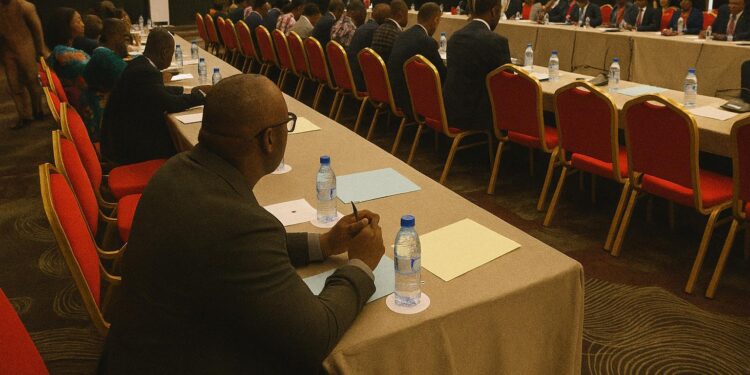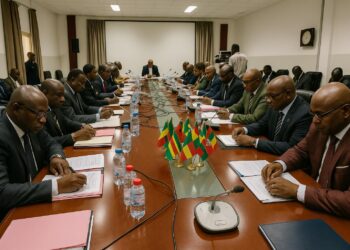Regional Vision Anchored in Multilateral Frameworks
When senior officials gathered in Brazzaville for the seventh session of Congo’s Committee of Focal Points on Regional Integration, the mood blended technical urgency with measured optimism. Anchored in the CEMAC Regional Economic Programme, the ECCAS Medium-Term Indicative Strategic Plan and the African Union’s Agenda 2063, the meeting served as a litmus test for Brazzaville’s capacity to translate continental visions into asphalt and customs reform. According to Director-General for Regional Integration Éric Mbéndé, the corridors under review are not abstract lines on a map but “living arteries that will determine whether the sub-region speaks the language of integrated markets or remains an archipelago of enclaves” (ECCAS Secretariat 2024).
Corridor 13 and the Quest for a Continuous Asphalt Spine
The Brazzaville-Bangui-N’Djamena route, known as Corridor 13, epitomises both ambition and complexity. It slices through three sovereign territories, each grappling with distinct security profiles and fiscal realities. Congolese technocrats reported that Phase II works—comprising the Ouesso-Sangha-Mbomou stretch—have reached 57 percent physical execution, an improvement attributed to joint monitoring missions led by the African Development Bank (AfDB 2023). Yet border bridges remain single-lane, threatening to convert future traffic surges into diplomatic bottlenecks.
Financing Architecture: From AfDB Windows to Public-Private Hybrids
Beyond engineering, the heart of the discussion lay in finance. With oil revenues fluctuating and concessional envelopes tightening, officials evaluated blended instruments that mix AfDB sovereign loans with commercial tranches syndicated by regional banks such as BDEAC. Early term-sheets indicate interest rates below six percent for maturities up to twenty years, a structure deemed “manageable within Congo’s debt-sustainability framework” by a senior Treasury adviser present at the session. The potential entry of the Africa50 platform to package public-private partnerships for weighbridge management signals an incremental yet strategic pivot toward private capital.
Interministerial Synergy as a Diplomatic Instrument
Director of Cabinet Sylvain Lekaka urged ministries to weave tighter ‘institutional fibres’ across transport, customs, finance and environment portfolios. Diplomatically, that synergy is not merely bureaucratic housekeeping; it constitutes a soft-power statement that Brazzaville can harmonise national interests with regional commitments. Observers from the ECCAS Commission noted that Congo’s domestic coordination has improved markedly since the establishment of a single-window mechanism for corridor data exchange last year (ECCAS Dashboard 2024).
Socio-Economic Dividends and the Imperative of Inclusive Growth
Economic modelling presented by the Ministry of Economy suggests that once fully asphalted, Corridor 5 linking Brazzaville and Libreville could cut freight costs by up to 38 percent, unlocking downstream gains in agro-commodity competitiveness. The committee, however, acknowledged that macro-level efficiencies must translate into micro-level livelihoods. A proposal to reserve 30 percent of roadside service contracts for local cooperatives illustrates an effort to diffuse benefits beyond urban enclaves, echoing the AU’s call for ‘people-centred integration’.
Navigating Risks: Security, Climate, and Fiscal Space
Delegates did not ignore headwinds. Insecurity in parts of the Central African Republic and northern Cameroon raises insurance premiums and could deter haulage firms. Meanwhile, climate scientists from the Congo Basin Observatory reminded the plenary that heavier rainfall patterns demand upgraded drainage standards, adding roughly ten percent to projected costs. Fiscal space, though recently buoyed by higher oil prices, remains sensitive to external shocks, prompting calls for contingency buffers within loan covenants.
Way Forward for Congo’s Convergence Agenda
The session closed with a consensus communiqué pledging quarterly progress dashboards and a joint mobilisation mission to Afreximbank headquarters early next year. In the corridors of the ministry, the atmosphere was neither triumphalist nor despondent; rather, it echoed a sober realisation that roads can be poured faster than trust can be built. Yet by placing interministerial cooperation at the core of its integration diplomacy, Congo-Brazzaville signalled that it intends to remain an indispensable node in Central Africa’s evolving logistics map.











































